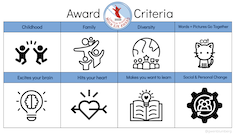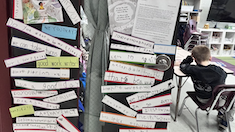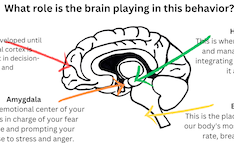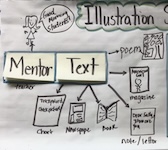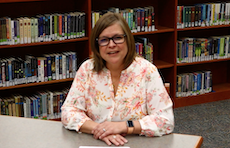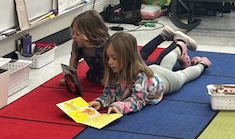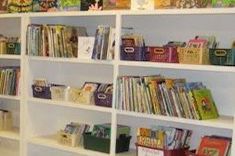Kindergarten
Latest Content
Books Are My Management Strategy
Becca Burk reflects on the power of reading as a way to set routines and help nourish healthy regulation.
And the Winner Is… Planning and Implementing a Mock Book Award
Gwen Blumberg shares a school-wide approach to a mock book award experience. This clear step-by-step guide with a rich resource download makes it possible to implement in any school.
Letting Go and Trusting Students
Becca Burk turned to her students when her class needed an idea for a school-wide door-decorating contest. She was reminded of the importance of trusting students and uplifting their voices.
What Just Happened? Download a Behavior Sheet
Becca Burk shares her new learning about how the brain responds to trauma and the way she uses neuroscience to help respond to challenging behaviors in her classroom. Download a practical behavior sheet to help guide your responses to tricky behaviors.
Community Circle
Bitsy Parks reminds us of the importance of taking time to talk, ask questions, and share thinking in a circle format. Community circle is a practice that strengthens an inclusive community.
Got Criteria? How to Help Students Engage with Success Criteria
Heather Fisher offers four tips for engaging our youngest students with daily criteria for success.
Whole-School Animal Research
Gigi McAllister shares an annual school-wide research project she leads in the library. You’ll be inspired by the way a focus on research can bring joy and belonging to all students in all grades.
Uplifting Independent Reading in the Living Room
Gwen Blumberg offers ways to make the library a welcoming space for readers to settle in with their choice of books. Classroom teachers can consider creating a living room, too.
Mentor Texts Elevate Readers and Writers
Bitsy Parks uses mentor texts to elevate her students as writers. Although mentor texts are included in many curriculum programs, Bitsy offers more opportunities for students to use mentor texts to strengthen their reading and writing lives.
Expecting Joy in the Classroom Library
Bitsy Parks shares the joy you can expect from the classroom library.
Meaning Makers
Josie Stewart and Hannah Tills push against the adage that “early readers are focused solely on learning to decode, while later readers are making meaning.” Instead they remind us of the beautiful way all readers are meaning makers.
I’m an Everything Person!
Bitsy Parks writes about the connection between identity and engagement, offering small steps to help all students believe in themselves as learners.
Indoor Walks
Gigi McAlister discovered that using indoor walks is a way to help students engage in their learning and strengthen their learning community through conversations.
Pick One: How to Establish a Community of Readers
“Pick one!” These are the words that begin to grow a community of readers. When students say, “I’m done,” Becca Burk points toward the classroom library and encourages them to pick a book and begin growing strong roots as a reader.
Reclaiming Space: Weeding to Grow a Healthy Library
Books, like gardens, need to be tended to regularly for the whole library to thrive. Gigi McAllister gives tips for anyone in the weeding process for their school or classroom library.
You Know How to Show Them
Becca Burk tackles the issues associated with distraction when it comes to helping students engage with a book rather than a device.
Morning Hike
Gwen Blumberg helps us consider and create space for a variety of personalities and learning needs. Inspired by a morning hike, she takes her observations and applies them to give space for all students to learn.
Responding to Dysregulated Behaviors: What About the Other Kids?
Becca Burk reflects on the other kids in the classroom who witness dysregulated behaviors from a classmate. She reminds us of the way grace and acceptance are prominent when we look for the silver linings in difficult situations. This is the third installment of a four-part series chronicling the responses when a student with dysregulated behaviors joins Becca Burk’s kindergarten class mid-year.
Responding to Dysregulated Behaviors: A Symptom of What?
When a new student spirals into anxiety and becomes aggressive, Becca Burk finds herself with a dislocated knee and advocating for the student to return to the classroom. This is the second installment of a four-part series chronicling the responses when a student with dysregulated behaviors joins Becca Burk’s kindergarten class mid-year.
Let’s Begin
Gwen Blumberg reflects on the community developed at a writing retreat and encourages teachers to consider the community of learners they will intentionally nourish this school year.
Responding to Dysregulated Behaviors: “What’s a Book?”
When a new student joins Becca Burk’s kindergarten classroom and asks, “What’s a book?” Becca realizes some behaviors are new to even the most veteran teachers. This is the first installment of a four-part series chronicling the responses when a student with dysregulated behaviors joins Becca Burk’s kindergarten class mid-year.
Kindergarten Celebration of Writing
Molly James encourages us to consider ways to make a writing celebration meaningful. You’ll be inspired by her kindergarten writing celebration.
Revisiting: Getting to Know My Students
Mandy Robek decided that despite the increasing pressures and time-consuming expectations, she will nourish healthy relationships with students. Here are some tried-and-true practices that she wants to maintain.
Story Walks
Christy Rush-Levine invites students into a story walk. While many of our school activities require students to sit still and be quiet, story walks with wordless books are a simple way to invite students to move and talk, with powerful outcomes.
Early Writing Opportunities in the Library
Gigi McAllister shares informal writing opportunities for students in the school library. Informal and engaging writing activities where students have lots of choice and encouragement make them feel empowered as writers, help them generalize the writing skills they are learning in the classroom, and create joyful writing experiences.
The Power of Story
Becca Burk reminds us of the power of story and community when she uses a social story to help a kindergartner overcome the fear and anxiety from being forgotten on the bus. Becca shows us how to use a social story to develop confidence to overcome difficulties.
Morning Message 5 — Meaning and Content Connections
In this installment of the morning message series, Ruth Metcalfe unlocks a wide range of opportunities to support learning in any content area.
Morning Message 4: Application and Differentiation
The possibilities for differentiation during morning message are almost endless. Ruth Metcalfe highlights ways to meet a wide variety of needs via the morning message.
Morning Message 3: Word Study and Conventions
There is much debate in today’s educational landscape around what and how to teach young readers about print. No matter what your classroom realities are around teaching how sounds, words, and language work, Ruth Metcalfe attests that using a morning message is an engaging way to support word study and conventions.
Morning Message 2: Routine and Community
Ruth Metcalfe reminds us of the power of routines and shows how over the course of time, morning message is an anchor in her first-grade classroom community.
Browse Content By
Type
Category
- Assessment Tools
- Big Fresh Archives
- Booklists
- Choice Numeracy
- Classroom Design
- Common Core
- Community Building
- Conferring
- Content Literacy
- Digital Literacy
- English Language Learners
- Equity
- Family Relations
- Free Samples
- Guiding Groups
- Leadership
- Literacy Coaches
- Mentor Texts
- Minilessons
- New Teacher Mentors
- Podcasts
- Poetry
- Quote Collections
- Reading Strategies
- Self Care
- Struggling and Striving Learners
- Talking and Listening
- Teacher Study Groups
- Teaching Reading
- Teaching Writing
- Word Study and Vocabulary
Author
- Melissa Quimby
- Nawal Qarooni
- Gwen Blumberg
- Julie Cox
- The Lead Learners
- Hannah Tills
- Josie Stewart
- Ruth Metcalfe
- Mallory Messenger
- Becca Burk
- Jodie Bailey
- Vivian Chen
- Mary Brower
- Tiffany Abbott Fuller
- Stephanie Affinito
- Ruth Ayres
- Leigh Anne Eck
- Heather Fisher
- Shari Frost
- Julie Johnson
- Suzy Kaback
- Gigi McAllister
- Shirl McPhillips
- Melanie Meehan
- Cathy Mere
- Debbie Miller
- Tara Barnett and Kate Mills
- Tammy Mulligan
- Dana Murphy
- Bitsy Parks
- David Pittman
- Brenda Power
- Heather Rader
- Matt Renwick
- Mandy Robek
- Christy Rush-Levine
- Gretchen Schroeder
- Jen Schwanke
- Brian Sepe
- Katherine Sokolowski
- Stella Villalba
- Jennifer Vincent
Grade Level
Choice Literacy Membership
Articles
Get full access to all Choice Literacy article content
Videos
Get full access to all Choice Literacy video content
Courses
Access Choice Literacy course curriculum and training


